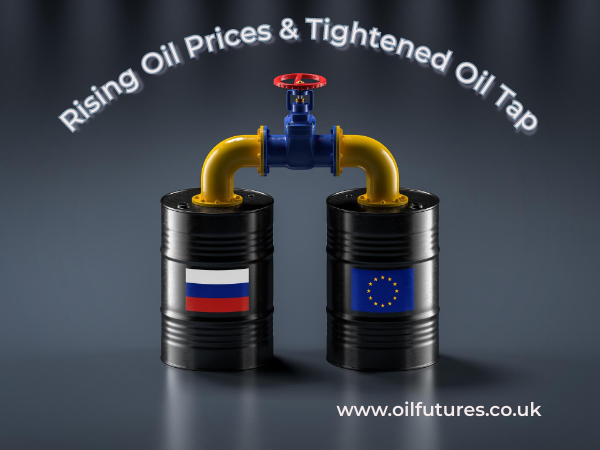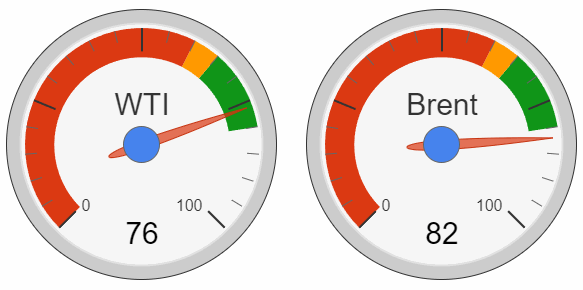 |
| Russian - EU oil trade - restrictions |
The price of crude oil rose this week, having come out of the static loop that it has been in for weeks.
As of 09.30 GMT on Friday, the prices of WTI and Brent stood at $76.76 and $81.28 respectively. The price of LNG, liquified natural gas, meanwhile, was at $2.55.
The rise in price of crude oil defied two major developments: the IEA, International Energy Agency, downgraded the forecast of demand growth of oil for the first time this year; moreover, the US crude inventories rose substantially during the past week; both signaled that economic concerns still swirl around the markets despite conflicting forecasts by major global financial institutions such as the IMF and World Bank.
The prices of oil rose as if Saudi Arabia and Russia got their way with their corresponding, substantial production cuts. Analysts, however, think it is far too early to link the two, given many other developments on the political front.
First of all, the fate of newly-formed alliances with obscure long-term political goals has been called into question; they sprang up from the combination of frustrations and emotions in recent times, at random rather than from long-held political principles and as this is the case, the long term survival appears to be highly doubtful.
The way Russia and Turkey have fallen out in the last few days is a case in point; the two countries that became very close after the war broke out between Ukraine and Russia, despite the latter being a powerful member of the NATO, seem to be at loggerheads over a few key issues: Turkey wants to revive its battered economy with the Western investments and boost it disastrously-devalued currency, lira; in addition, it wants buy 40, F-16 US fighter jets and ditched its opposition to Sweden joining the NATO that in turn has annoyed Russia.
That is not the only major political development; the relations between Russia and one of its major Middle Eastern allies, Iran, have strained too over the former supporting the UAE, turning its back on Iran in a dispute involving three small islands.
The UAE claims the right for three islands in the Strait of Hormuz between the Persian Gulf and Gulf of Oman that Iran forcefully occupied in 1971, just before the formation of the UAE after the British left the region; the issue has been a major bone of contention between the two regional powers, the UAE and Iran, since then.
When Russia said that the islands in question belong to the UAE recently, Iran just went ballistic; it summoned the Russian ambassador and lodged a protest, driving a wedge between the two supposedly strong allies that used to see the US as the common troublemaker.
The issue over the occupation of the islands by Iran has the potential to sour the recently-revived relations between the Arab nations in the Middle East and Shite-dominated Iran - once again.
In short, the alliances that appeared to challenge the dominance of the US dollar as the word's reserved currency by so-called de-dollarization, do not seem to move full steam ahead in challenging the word's only superpower, the US. On the contrary, they seem to be drifting towards their old, comfortable domains that they had been in for decades.
In light of these developments, the production of oil may be determined purely by individual national interests rather than a collective resolve based on common economic goal.
The production cuts in order to boost the oil prices, especially when a sharp rise in demand is not on the horizon, are going to be problematic for the oil producers, including Russia and Saudi Arabia, because they result in a sharp drop in revenues.
For instance, the draft budget of Kuwait shows a staggering deficit of $22.2 billion for the fiscal year 2023/24, due to falling oil revenues. The UAE, meanwhile, has made it clear it will not embark on production cuts by saying that the current cuts are enough to bring about the stability in the crude oil markets.
Iran, meanwhile, is on a vigorous charm offensive in Africa at present in order to revive its own sanction-hit economy. It wants to sell more oil too in order to bring in more revenues.
The price of oil above $80 a barrel is going to cause headaches for the West too, especially when the countries struggle to dealing with rising inflation and interest rate hikes, as an inevitable consequence.
In the past, the US kept releasing oil from its SPR, Strategic Petroleum Reserve, in order to keep the prices stable at the expense of what was left in the reserve, drawing in criticism from the Republican lawmakers - as the last resort - when the Middle Eastern producers refused to increase the productions.
If the price of oil goes substantially above $80 a barrel, the US will be forced to look for alternatives before it becomes a major political issue, especially before the presidential elections, next year.
In this context, political analysts believe the talks on reviving the JCPOA, 2015 Iran nuclear deal, may gather momentum in the next few weeks - once again - so that Iran can make its contribution to the commodity markets as a legitimate player.
A development of that kind will bring the OPEC+ under more strain when it struggles to keep the unity among members.








